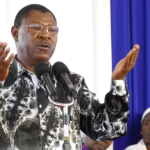In a copyright infringement case involving celebrated artiste Nyamari “Nyashinski” Ongegu and Nigerian music producer Sam Are Eliapenda over a multi-million endorsement deal with Tecno Kenya Limited, the court is poised to issue a ruling on June 10. Magistrate Selina Muchungi announced this decision after Nyashinski once again failed to present the brand ambassadorial contract he signed with Tecno, as previously ordered by the court.
The disagreement centers on the content of the contract since Sam Are alleged that Nyashinski used the hit song “Wach Wach”, produced by Sam Are, to endorse Tecno Camon 20 without consent or compensation. While both parties own 50 per cent of the publishing rights to “Wach Wach”, Nyashinski holds 100 per cent of the master rights.
Despite the split in publishing rights, Sam Are contends that he deserves a portion of the endorsement deal proceeds, but Nyashinski has not cooperated. Despite previous court orders to produce the contract, Nyashinski’s legal team, Humphrey & Co. Advocates, argued that the brand ambassador agreement is subject to a non-disclosure agreement, making it impossible to present in court.
“The brand ambassador agreement is subject to a non-disclosure agreement, a confidential agreement which we cannot produce in court,” Nyashinski’s lawyers argued.
Magistrate Muchungi then issued a fresh order instructing Nyashinski’s legal team to produce the agreement within 14 days, which they failed to do. Subsequently, Nyashinski’s lawyer, Eddie Omondi, argued that a written application from the plaintiff formally requesting the contract’s disclosure and justifying the need for the confidentiality agreement was necessary.
“Your Honour, it is indeed true that we have not been able to produce the said document. The plaintiff must show cause as to why he needs us to disclose a document that is covered by a non-disclosure agreement,” Omondi argued.
The magistrate then directed David Katee, representing Sam Are, to make a formal application for the contract’s disclosure, with Nyashinski’s legal team instructed to respond. Despite being served with the application, Nyashinski’s representatives failed to file a response by the hearing date on May 6.
In response, Nyashinski’s lawyers cited their client’s unavailability as the reason for the delay. However, the magistrate denied their request and ordered both parties to file submissions by June 10 for compliance confirmation and setting a ruling date.



